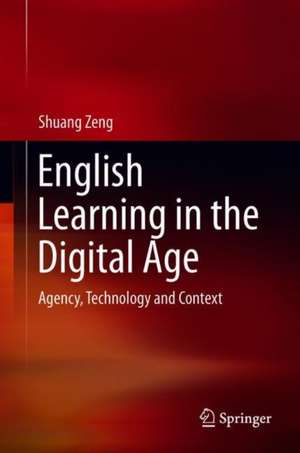English Learning in the Digital Age: Agency, Technology and Context
Autor Shuang Zengen Limba Engleză Hardback – 5 dec 2018
The argument is developed on the basis of the findings of a mixed sequential study that focused on 1485 Chinese undergraduates’ use and non-use of online tools and applications outside the English classroom. Particular attention is paid to the role of context and agency when understanding their learning choices and behaviours in the context of digital technology. In particular, the book acknowledges the explanatory power of agency in the minority instances of ‘good practices’ among these EFL learners. At the same time it demonstrates that for most learners, use of the current web is limited and mostly non-interactive. The barriers to ‘2.0’ transfer are largely contextual and the so-called ‘communicative opportunities’ and ‘participatory culture’ in particular did not fit into the learners’ sociocultural context of (language) learning.
Overall, the compelling argument proposes that the technology-facilitated changes in EFL practices are a ‘bottom up’ process that is taking place in day-to-day situations and constrained by the learning context within which the learner is situated. Based on these arguments, the book provides a framework that challenges the existing beliefs about (language) learning with online technology, and that contributes to our understanding of how context mediates EFL learners’ behaviours surrounding digital technologies. It is a valuable resource for teachers, researchers and policy makers, providing them with insights into using digital technology to stimulate ‘good learning practices’ outside the classroom.
Preț: 586.88 lei
Preț vechi: 690.45 lei
-15% Nou
Puncte Express: 880
Preț estimativ în valută:
112.33€ • 121.25$ • 94.19£
112.33€ • 121.25$ • 94.19£
Carte tipărită la comandă
Livrare economică 19 aprilie-03 mai
Preluare comenzi: 021 569.72.76
Specificații
ISBN-13: 9789811324987
ISBN-10: 9811324980
Pagini: 262
Ilustrații: XIII, 212 p. 39 illus., 22 illus. in color.
Dimensiuni: 155 x 235 mm
Greutate: 0.5 kg
Ediția:1st ed. 2018
Editura: Springer Nature Singapore
Colecția Springer
Locul publicării:Singapore, Singapore
ISBN-10: 9811324980
Pagini: 262
Ilustrații: XIII, 212 p. 39 illus., 22 illus. in color.
Dimensiuni: 155 x 235 mm
Greutate: 0.5 kg
Ediția:1st ed. 2018
Editura: Springer Nature Singapore
Colecția Springer
Locul publicării:Singapore, Singapore
Cuprins
Chapter 1 Towards ‘Learner Experience Research’.- Chapter 2 Towards an Investigation of Language Learners’ (Non)use of Online Technology.- Chapter 3 A Sociocultural Framework for the Study of WELL Use.- Chapter 4 Questioning WELL Use in the Chinese University Context:Research Questions and Methods.- Chapter 5 The Trends of English Learning Related Use of Technology: the Role of Technology.- Chapter 6 ‘Breaking Away’ with Digital Technology: the Role of Agency.- Chapter 7 Resistance to Moving to Web 2.0: the Role of Context.- Chapter 8 Understanding Language Learners’ (Non)use of Digital Technology.
Notă biografică
Shuang Zeng’s research focuses on foreign language learners and the impact of digital technology on foreign language learning. She is now lecturing at the University of Shanghai for Science and Technology. Shuang holds a BA in English literature from Sichuan International Studies University. She took her MA in examining e-learning at the University of Oxford and her PhD at the UCL Institute of Education.
Textul de pe ultima copertă
Moving beyond the ‘Web 2.0’ and ‘digital native’ rhetoric, this book addresses the complex experiences of learners of English as a foreign language (EFL) in a world embedded with interactive and participatory technologies. Adopting a sociocultural perspective, it investigates EFL learners’ behaviours concerning digital technology, and guides exploration into their contextually mediated choices and learning practices in the ‘2.0’ era.
The argument is developed on the basis of the findings of a mixed sequential study that focused on 1485 Chinese undergraduates’ use and non-use of online tools and applications outside the English classroom. Particular attention is paid to the role of context and agency when understanding their learning choices and behaviours in the context of digital technology. In particular, the book acknowledges the explanatory power of agency in the minority instances of ‘good practices’ among these EFL learners. At the same time it demonstrates that for most learners, use of the current web is limited and mostly non-interactive. The barriers to ‘2.0’ transfer are largely contextual and the so-called ‘communicative opportunities’ and ‘participatory culture’ in particular did not fit into the learners’ sociocultural context of (language) learning.
Overall, the compelling argument proposes that the technology-facilitated changes in EFL practices are a ‘bottom up’ process that is taking place in day-to-day situations and constrained by the learning context within which the learner is situated. Based on these arguments, the book provides a framework that challenges the existing beliefs about (language) learning with online technology, and that contributes to our understanding of how context mediates EFL learners’ behaviours surrounding digital technologies. It is a valuable resource for teachers, researchers and policy makers, providing them with insights into using digital technology to stimulate ‘good learning practices’ outside the classroom.
Caracteristici
Reveals the gap between the rhetoric and reality of language learning with the current web Analyses and explains the technology resistance in out-of-class English learning from a sociocultural perspective Proposes a framework that explains choice of technology use among language learners
